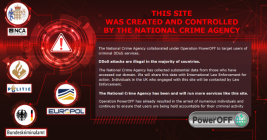Search Results for: booter
Thinking of Hiring or Running a Booter Service? Think Again.
Most people who operate DDoS-for-hire services attempt to hide their true identities and location. Proprietors of these so-called “booter” or “stresser” services — designed to knock websites and users offline — have long operated in a legally murky area of cybercrime law. But until recently, their biggest concern wasn’t avoiding capture or shutdown by the feds: It was minimizing harassment from unhappy customers or victims, and insulating themselves against incessant attacks from competing DDoS-for-hire services.
And then there are booter store operators like John Dobbs, a 32-year-old computer science graduate student living in Honolulu, Hawaii. For at least a decade until late last year, Dobbs openly operated IPStresser[.]com, a popular and powerful attack-for-hire service that he registered with the state of Hawaii using his real name and address. Likewise, the domain was registered in Dobbs’s name and hometown in Pennsylvania.
The only work experience Dobbs listed on his resume was as a freelance developer from 2013 to the present day. Dobbs’s resume doesn’t name his booter service, but in it he brags about maintaining websites with half a million page views daily, and “designing server deployments for performance, high-availability and security.”
In December 2022, the U.S. Department of Justice seized Dobbs’s IPStresser website and charged him with one count of aiding and abetting computer intrusions. Prosecutors say his service attracted more than two million registered users, and was responsible for launching a staggering 30 million distinct DDoS attacks.
Booter Boss Busted By Bacon Pizza Buy
A Pennsylvania man who operated one of the Internet’s longest-running online attack-for-hire or “booter” services was sentenced to five years probation today. While the young man’s punishment was heavily tempered by his current poor health, the defendant’s dietary choices may have contributed to both his capture and the lenient sentencing: Investigators say the onetime booter boss’s identity became clear after he ordered a bacon and chicken pizza delivered to his home using the same email address he originally used to register his criminal attack service.
Booter Boss Interviewed in 2014 Pleads Guilty
A 20-year-old Illinois man has pleaded guilty to running multiple DDoS-for-hire services that launched millions of attacks over several years. The plea deal comes almost exactly five years after KrebsOnSecurity interviewed both the admitted felon and his father and urged the latter to take a more active interest in his son’s online activities.
Hackforums Shutters Booter Service Bazaar
Perhaps the most bustling marketplace on the Internet where people can compare and purchase so-called “booter” and “stresser” subscriptions — attack-for-hire services designed to knock Web sites offline — announced last week that it has permanently banned the sale and advertising of these services.
Are the Days of “Booter” Services Numbered?
It may soon become easier for Internet service providers to anticipate and block certain types of online assaults launched by Web-based attack-for-hire services known as “booter” or “stresser” services, new research released today suggests.
Stress-Testing the Booter Services, Financially
The past few years have witnessed a rapid proliferation of cheap, Web-based services that troublemakers can hire to knock virtually any person or site offline for hours on end. Such services succeed partly because they’ve enabled users to pay for attacks with PayPal. But a collaborative effort by PayPal and security researchers has made it far more difficult for these services to transact with their would-be customers.
Ragebooter: ‘Legit’ DDoS Service, or Fed Backdoor?
On Monday, I profiled asylumbooter.com, one of several increasingly public DDoS-for-hire services posing as Web site “stress testing” services. Today, we’ll look at ragebooter.net, yet another attack service except for one secret feature which sets it apart from the competition: According the site’s proprietor, ragebooter.net includes a hidden backdoor that lets the FBI monitor customer activity.
‘Booter Shells’ Turn Web Sites into Weapons
Hacked Web sites aren’t just used for hosting malware anymore. Increasingly, they are being retrofitted with tools that let miscreants harness the compromised site’s raw server power for attacks aimed at knocking other sites offline.
It has long been standard practice for Web site hackers to leave behind a Web-based “shell,” a tiny “backdoor” program that lets them add, delete and run files on compromised server. But in a growing number of Web site break-ins, the trespassers also are leaving behind simple tools called “booter shells,” which allow the miscreants to launch future denial-of-service attacks without the need for vast networks of infected zombie computers.
Interview With a Crypto Scam Investment Spammer
Social networks are constantly battling inauthentic bot accounts that send direct messages to users promoting scam cryptocurrency investment platforms. What follows is an interview with a Russian hacker responsible for a series of aggressive crypto spam campaigns that recently prompted several large Mastodon communities to temporarily halt new registrations. According to the hacker, their spam software has been in private use until the last few weeks, when it was released as open source code.






